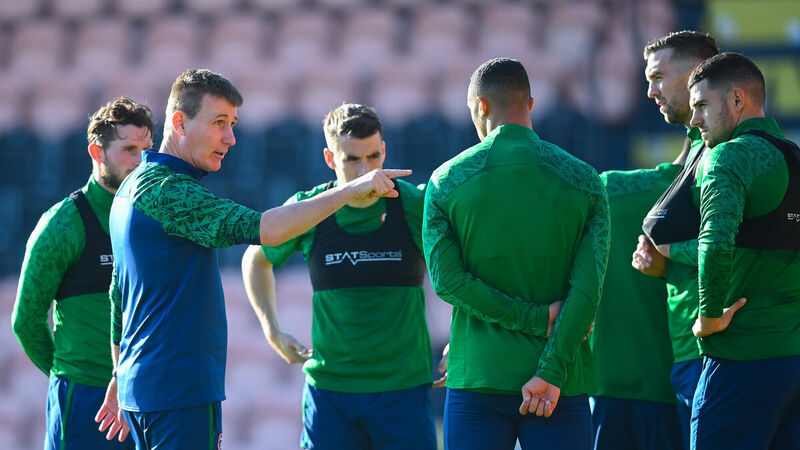Tommy Martin on Ireland v England: A game nobody wants, in front of nobody, without animus

Manager Stephen Kenny speaking to his players during a Republic of Ireland training session at The Hive in London. Picture: Stephen McCarthy/Sportsfile
When you think about it, tonight’s match between England and the Republic of Ireland is an event of great historical significance.
Not in itself, of course. In the long history of encounters between the two nations, this may well be the least important. And I don’t just mean in war or football. There have been Irish contestants on The X Factor whose fortunes will have more impact on the nation than whatever happens at Wembley tonight.
This, after all, is an international soccer friendly. At the best of times, international soccer friendlies struggle to set pulses racing. Right now they are as welcome as a projectile sneeze in an elevator.
The meeting of England and Ireland doesn’t even fall under the auspices of the Nations League, whose sanctity and integrity must be upheld at all times. That a lethal pestilence can sweep the globe and still not interrupt the Nations League underlines its importance to humanity.
Indeed, it is reassuring to think that, in the event of an alien attack on the earth, even as a gigantic laser is poised to obliterate the entire planet, the likes of Belarus and Lithuania will still be dutifully fulfilling a crucial Nations League promotion tussle.
No, England and Ireland are playing in an international soccer friendly, the thing that the Nations League was sent from the future to kill but which has somehow survived, like a particularly ornery cockroach.
We have played England in two of these in the last decade. Shane Long scored in one, I think. Other than that? Sorry, it’s a blank.
International friendlies are a concept so lacking in meaning that you can play in them for one country and still switch to play for a completely different country afterwards. That the opportunity to boo Declan Rice and Jack Grealish has been denied to Irish fans robs this game of one tiny, puerile morsel of validation.
This is a game that pretty much nobody wants, taking place in an international window that nobody wants, in front of nobody.
However, whether by coincidence or act of historical kismet, this relatively inconsequential meeting of Irish- and Englishmen on a sporting field does takes place almost 100 years after one that had the ultimate significance.
The commemoration of Bloody Sunday will be a more low-key affair than it might have been in different times. Nonetheless, the GAA have laid on a whole range of events, talks, exhibitions and interactive multi-media content to mark the occasion.
A series of films and podcasts continue the work of author and journalist Michael Foley in his book ‘ ’, the definitive account of that tragic day. Reading Foley’s book brought back for a modern audience the real lived experience of an event which had been lost in historical mythos.
For most of the last century whenever Ireland played England, from our point of the view, the events of November 20, 1920 and their broader context were the emotional background shading.
Certainly, the successes of the Irish soccer team under Jack Charlton were burnished by regular triumphs over the old oppressor, even if the scoreline was usually 1-1. Historical parallels went beyond the metaphorical with the Lansdowne Road riot of 1995, when English violence returned to an Irish sporting arena.
Even in 2007, when an English rugby team were applauded under the Hogan Stand and the respect afforded God Save the Queen was heralded as a sign of national maturity, there was never any doubt that Ireland were expected to unleash vengeance upon the visitors.
None of that applies at Wembley.
That’s partly, as we have mentioned, because it is an international soccer friendly. It’s also because they are so much better than us now.
In Big Jack’s day, our squads lived cheek by jowl in the top echelons of English football. It was only right that we gave them a bloody nose every now and again.
At that time English clubs were banned from Europe. Now their players are in the Champions League and they plan on winning World Cups. We, on the other hand, are worried about the retirement of a 33-year-old Sheffield United striker with one international goal. Right now our quarrels are with the Bulgarias and Slovakias of this world, not England.
Mostly though, it’s a good thing that English and Irish meet on a sporting field without animus or edge.
When the missiles rained down from the Lansdowne Road West Stand, the Good Friday Agreement was three years away. Since then, a generation has grown up with the relationship between Ireland and England as the stuff of stand-up comedy observation rather than rebel song lament.
Mild hostility only arises when the Brits annex famous Irish people as their own, although The Claiming of Saoirse does sound like a potential Wolfe Tones number.
The Brexit debacle has risked ruining this cosy, Dara Ó Briain gag consensus. But most of us know from sharing messages on Whatsapp with sane British friends that this is really an English civil war and nothing personal against us. Having reintroduced them to the concept of the Irish border, which they had rather clumsily forgotten inventing, we are confident that our place within Europe gives us the upper hand on this one.
It’s that shifting of roles between ourselves and our neighbours that gives meaning to this otherwise rather meaningless international soccer friendly.
We commemorate our national struggle with podcasts rather than petrol bombs. Paul O’Connell wears a poppy on British television and, well, you might not like it but what are you going to do about it? Ireland now sees itself as a sort of groovy, proto-Scandi liberal utopia and its old enemy as a rambling loon shouting at people in the street.
Neither of these views are entirely accurate, but they help explain why this game is only of historical significance if it delivers Stephen Kenny’s first win, ideally brought about by an embarrassing Declan Rice own goal.
And’s that’s pretty significant in itself, historically speaking.



